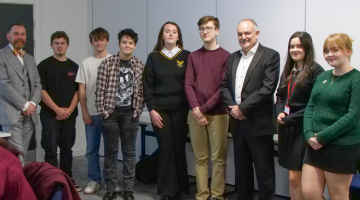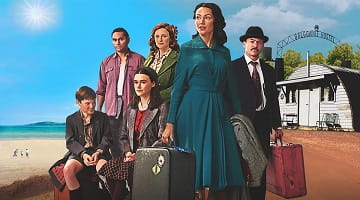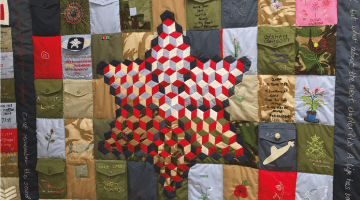2024/25 entry
BA (Hons) History and English Literature
Clearing
Want to study with LJMU this September? Visit our Clearing hub to apply now if you have your grades or register your interest and become a Clearing Insider to receive updates while you wait for your results. Your journey starts with Clearing.
Minimum UCAS points required: TBC
Why study History and English Literature at Liverpool John Moores University?
- Taught by a passionate team of academics
- In 2020 National Student Survey 91% of our students agreed they were satisfied with the overall quality of the course
- Teaching from leading academics who have written scholarly works on topics ranging from American foreign policy to sport in the Soviet Union, through to Sherlock Holmes and Irish rock music
- A broad range of module topics that includes Britain, Ireland, Europe, Japan and sub-Saharan Africa
About your course
Studying BA (Hons) History and English Literature at Liverpool John Moores University is designed to enable you to understand the past and present, and how that is captured in literature.
This degree is inspired by and is firmly rooted in the city of Liverpool. It draws on the cultural, social, historical and literary context of the city across a range of modules, including 'Liverpool Legacies and Exploring History where students work with cultural partners and institutions across the city region, including the Museum of Liverpool, the Museum of Popular Music, the Tate, the Maritime Museum and Granby Winter Gardens. You will also be given extended, more formal opportunities to work with cultural partners and local businesses and schools to gain valuable work experience.
The dual elements of the History and English Literature programme are complimentary, allowing students to study innovative topics and texts, following bespoke pathways through the programme which speak to your specific interests, be that Post-colonialism; the Victorians; or modern America. This distinctive programme encourages students to become a part of a vibrant community of students, post-graduate researchers and staff, to develop their own academic interests, and to prepare for next steps after graduation.
"LJMU offers diverse history modules and histories that stretch the globe - from the English Civil War to the Japanese Meiji Restoration period. You'll come across themes and issues in the literary texts and accumulate knowledge that you can apply to your history studies. The support you receive is excellent and the lecturers, from both departments, go above and beyond to provide entertaining, structured and worthwhile lectures."
Fees and funding
There are many ways to fund study for home and international students
Fees
The fees quoted above cover registration, tuition, supervision, assessment and examinations as well as:
- Library membership with access to printed, multimedia and digital resources
- Access to programme-appropriate software
- Library and student IT support
- Free on-campus wifi via eduroam
Additional costs
Although not all of the following are compulsory/relevant, you should keep in mind the costs of:
- accommodation and living expenditure
- books (should you wish to have your own copies)
- printing, photocopying and stationery
- PC/laptop (should you prefer to purchase your own for independent study and online learning activities)
- mobile phone/tablet (to access online services)
- field trips (travel and activity costs)
- placements (travel expenses and living costs)
- student visas (international students only)
- study abroad opportunities (travel costs, accommodation, visas and immunisations)
- academic conferences (travel costs)
- professional-body membership
- graduation (gown hire etc)
Funding
There are many ways to fund study for home and international students. From loans to International Scholarships and subject-specific funding, you'll find all of the information you need on our specialist funding pages.
Employability
Our former students are to be found working in occupations including advertising, marketing, museums, arts administration and publishing to industrial, retail, leisure and charitable organisation management, educational administration, accountancy, law, the social and Civil Services and teaching.
Some graduates complete teacher training PGDE courses at LJMU or other providers or use their skills in other types of teaching, such as English as a second language or adult education. Another option is to continue in education with a masters, PhD or vocational course such as journalism or marketing.
Student Futures - Careers, Employability and Enterprise Service
A wide range of opportunities and support is available to you, within and beyond your course, to ensure our students experience a transformation in their career trajectory. Every undergraduate curriculum includes Future Focus during Level 4, an e-learning resource and workshop designed to help you to develop your talents, passion and purpose.
Every student has access to Careers Zone 24/7, LJMU's suite of online Apps, resources and jobs board via the LJMU Student Futures website. There are opportunities for flexible, paid and part-time work through Unitemps, LJMU's in-house recruitment service, and we also offer fully funded Discovery Internships.
One-to-one careers and employability advice is available via our campus-based Careers Zones and we offer a year-round programme of events, including themed careers and employability workshops, employer events and recruitment fairs. Our Start-Up Hub can help you to grow your enterprise skills and to research, plan and start your own business or become a freelancer.
A suite of learning experiences, services and opportunities is available to final year students to help ensure you leave with a great onward plan. You can access LJMU's Careers, Employability and Start-up Services after you graduate and return for one-to-one support for life.
Go abroad
LJMU aims to make international opportunities available to every student. You may be able to study abroad as part of your degree at one of our 100+ partner universities across the world. You could also complete a work placement or apply for one of our prestigious worldwide internship programmes. If you wanted to go abroad for a shorter amount of time, you could attend one of our 1-4 week long summer schools.
Our Go Citizen Scheme can help with costs towards volunteering, individual projects or unpaid placements anywhere in the world. With all of these opportunities at your feet, why wouldn’t you take up the chance to go abroad?
Find out more about the opportunities we have available via our Instagram @ljmuglobalopps or email us at: goabroad@ljmu.ac.uk.
A life-changing experience
There's so much more to university than just studying for a degree.
News and views
Browse through the latest stories and updates from the University and beyond
What you will study on this degree
Please see guidance below on core and option modules for further information on what you will study.
Learn more about the modules you'll be studying on the course with this useful module guide.
Further guidance on modules
Modules are designated core or optional in accordance with professional body requirements, as applicable, and LJMU’s Academic Framework Regulations. Whilst you are required to study core modules, optional modules provide you with an element of choice. Their availability may vary and will be subject to meeting minimum student numbers.
Where changes to modules are necessary these will be communicated as appropriate.
Level 4
Core modules
Literary and Cultural Theory
20 credits
The aim of this module is to provide you with an understanding of the basic strands of literary and cultural theories, such as feminism, Marxism, postcolonial theory, and psychoanalysis. It will allow you to explore and evaluate these theoretical perspectives through practical application to literary texts as well as to other primary sources.
Level 5
Optional Modules
The Soviet Experiment, 1917-1991
20 credits
This module will provide an understanding of the early Soviet state and its relationship to society. You will gain knowledge and skills to understand, identify and critically assess different kinds of source material.
Short Cuts: Writing in Brief
20 credits
The aim of this module is to analyse a wide variety of short writing from the post-Second World War era to develop skills of close reading and textual analysis. You will also explore the relationship between short writing and modernity/contemporary culture.
Revolutionaries: International Communism from the Great War to the Cold War
20 credits
The module incorporates the following LJMU Employability Skills:
- Analysis, problem solving and decision making.
- Planning and organisation.
- Creativity and enterprise.
- Intercultural skills.
Level 6
Core modules
Dissertation
40 credits
The aim of the Dissertation is to develop the ability to identify a relevant historical topic and formulate a research proposal designed to explore aspects of that topic to a high level. You will develop the ability to analyse and interpret primary and secondary historical sources in pursuit of a self-defined problem.
Optional Modules
Living with Defeat: France and the Second World War, History and Legacies
20 credits
This module aims to introduce key social, cultural and political contexts and historical debates concerning everyday life in France in the period leading up to, during and following the Second World War. You will be introduced to key historiographical debates such as the legacies of the First World War, the significance of political and social divisions in 1930s France and the reasons for the defeat of 1940.
We would not know there was a war on. Life on the British Home Front During the Second World War.
20 credits
The aim of this module is to provide an insight into the people's experience of living day-by-day in Britain during the Second World War. You will be introduced to the theoretical approach of cultural history on how people situate themselves within society irrespective of the greater events being played out around them.
English Independent Study
20 credits
This module will give you an opportunity to pursue your own intellectual interests to undertake an independent academic study, working on your own initiative and building strong time management skills.
Soviet Body Politics: Sport, Leisure and Health, 1917-1945
20 credits
The aim of this module is to introduce you to Bolshevik concepts of the body, and how these related to wider social, political, economic and cultural issues. You will be provided with an in-depth understanding of the early Soviet state and society, developing their analytical, critical, and communication skills.
Our House: Representing Domestic Space
20 credits
The aim of this module is to analyse domestic space as an important aspect of contemporary culture, to familiarize you with a range of disciplinary and philosophical traditions which have focused upon domestic space.
C21: British Fiction Now
20 credits
This module will extend your knowledge of the diversity and range of British writing in the twenty-first century in order to explore key events that shape literary culture in Britain today.
Victorian Cities
20 credits
The aim of this module is to introduce the history of Victorian cities. You will investigate the themes of class and gender in the Victorian city which will enable you to think critically about and historicise urban identities.
Shakespeare
20 credits
This module will reinforce the ability to critically analyse texts in close detail to examine a range of Shakespeare's plays in the context of their original cultural production.
Vamps and Villains: Exploring Gothic Fiction
20 credits
This module will examine the genre of Gothic fiction as it has developed over two centuries to explore the cultural, historical and intellectual contexts that shape the moment of its production.
World Literature: Writing from the Periphery
20 credits
This module will introduce the concept of 'world literature' through a selection of texts from the twentieth to the twenty-first centuries in relation to the rise and expansion of a global modernity. You will examine on-going critical debates around key areas of research in the global humanities: a singular modernity, the politics of translation, the periphery and the world system.
When the Sun Set in the East: End of Empire in Southeast Asia
20 credits
This module will apply historiographical themes in the study of decolonisation to a set of case studies in the Southeast Asia region to examine the programme themes of 'nation, state and power', 'structure and agency' and 'culture, locale and identity' in relation to decolonisation in the developing world, and specifically in Southeast Asia. You will be able to demonstrate variety and diversity in the experience of decolonization, particularly in Southeast Asia.
Transitions: Identities in the Interwar Years
20 credits
This module examines shifting identities and the intersections of class, sexuality, gender and regionality in British literature of the interwar years. It moves across popular, middlebrow and experimental fiction and looks at poetry, non-fiction and magazine publishing as a means of examining the changing cultural formations of the period.
Green Victorians
20 credits
This module explores how Victorian writers responded to environmental changes. It examines key historical and intellectual developments shaping debates about the natural world in the Victorian period; you consider links between the historical past and current modes of environmentalism.
Celebration and Commemoration in Irish History
20 credits
The aim of this module will enable you to engage in a critical debate about the historiography associated with key events in Irish history. You will engage with different methods of teaching history to different audiences to critically assess the way in which the 1798 Rebellion, the Great Irish Famine and the 1916 Easter Rising have been commemorated and celebrated by later generations.
Mind Readings
20 credits
This module explores the representation of the mind and mental states in literary texts, with a focus on madness and unconventional states of mind. It introduces students to the interdisciplinary study of literature alongside psycho-sciences, including psychoanalytic literary criticism, the history of psychiatry, medical-model psychology, and cognitive literary studies. Students will question established discourses and modes of representing madness and the mind in contemporary culture, challenging scientific and medical authority.
Space and place: travel writing at home and abroad
20 credits
This module enhances students' understanding of non-fiction travel literature, encouraging nuanced interpretations and effective long-form writing. It explores travel narratives' reflection of encounters with otherness, reassessment of the familiar, and their link to human identity and the non-human world. Indicative texts range from Mary Wollstonecraft to Robert Macfarlane, spanning from the late-eighteenth to the early 21st century.
Developments in Contemporary Writing and Publishing
20 credits
This module delves into contemporary literature, covering fiction, non-fiction, and poetry, and explores current debates in the English-speaking publishing world. It emphasizes how production circumstances shape contemporary texts and encourages reflection on the writer's role in modern society. Topics include women's history in the era of #Me Too, climate fiction, diversity in publishing, gender identity, freedom of speech, 'cancel culture,' and pandemic writing. Students will engage with works by various authors such as Hallie Rubenhold, Reni Eddo-Lodge, and Akwaeke Emezi.
Nazi Germany: Dictatorship and Genocide
20 credits
This module provides students with specialized knowledge about the history of Germany during the National Socialist dictatorship, including totalitarian rule and the persecution of political opponents, ethnic and religious minorities. It extensively covers the Holocaust and offers a deep understanding of historiographical debates related to the Third Reich and the Holocaust. The syllabus includes lectures and seminars on various topics, such as the rise of the Nazis, establishment of the Nazi dictatorship, opposition to the Nazi regime, Nazi foreign policy, anti-Jewish policies, the Holocaust, and the aftermath of the Third Reich and the Holocaust.
Modern Fiction and Environment Crisis
20 credits
This module focuses on modern fiction focused on the urgent environmental crises with which we are now obliged to reckon. Some of the issues you will engage with on this module include climate, the environment as a concept, the non-human, and the alternative approaches to nature represented in indigenous narrative systems.
Black Lives in American Literature
20 credits
This module explores writing by and about African Americans from the mid-twentieth century to the present; you will consider how Black writers and artists have contested racial injustices, articulated new identities, and identified grounds for solidarity and alliance.
Migrants to the Screen
20 credits
This module focuses on recent works of transnational fiction that have been adapted for the screen. Drawing on literary studies, film studies, adaptation studies, and postcolonial studies, you will examine novels about migrants alongside their film adaptations, considered as ‘migrants’ from page to screen.
History Works
20 credits
Within this module, you will have the opportunity to acquire a work-based or work-related learning experience. This
will help you to identify the links between your degree and employability prospects. LJMU will support you to
identify, enhance, and deploy transferable skills and abilities relevant to the workplace.
The Literature of Extinction: American Writing and the Environment
20 credits
This module explores how extinction on various scales, from the local and national to the planetary, is conceptualized and represented in American environmental and ecocritical texts, including fiction, nature writing, and ecocritical theory.
Teaching and work-related learning
Excellent facilities and learning resources
We adopt an active blended learning approach, meaning you will experience a combination of face-to-face and online learning during your time at LJMU. This enables you to experience a rich and diverse learning experience and engage fully with your studies. Our approach ensures that you can easily access support from your personal tutor, either by meeting them on-campus or via a video call to suit your needs.
Teaching is delivered via a combination of lectures, online activities and tutorials, with additional information available on Canvas (our virtual learning environment) and in our Learning Resource Centre. Tutorials are fairly informal and provide an opportunity to further discuss material covered in the lectures. Once you reach your final year, your dissertation offers the chance to work more independently and focus on an area that particularly interests you.
Work-related Learning
This programme is centred on helping you to develop first-rate skills in communication and critical analysis, which are highly valued by employers. This is why a History and English Literature degree is a good basis for so many different careers.
At Level 5, you also have the opportunity to spend at least one month on a work placement in the United States after undertaking a specially designed module to help you prepare for it. This is a once-in-a-lifetime opportunity to get invaluable work experience in a different culture and could even lead to employment once you graduate.
Past students have worked for the editor of Vogue, an advertising agency and a film company in New York, a Hollywood celebrity magazine, theatres on Broadway, a jazz magazine in New Orleans, an architects office in California and theme parks in Florida and New Jersey.
Support and guidance
Dedicated personal tutor, plus study skills support
History and English Literature students at LJMU form part of a lively and supportive learning environment. If you join us, you will be given the support needed to enable you to reach your full potential in your studies and to help you make a decision about your future career. Lecturers in History and English Literature are supportive and approachable. We are proud of our students' achievements both during their studies and after graduation.
From the moment you begin your studies at LJMU, you will be allocated a personal tutor who will meet with you one-to-one to discuss course-related issues, monitor your progress and help you to put your career plans in place. They will be a point of contact for you throughout the degree. You will also receive advice and feedback on your assignments from module tutors.
Assessment
Assessment varies depending on the modules you choose, but will usually include a combination of exams and coursework.
We acknowledge that all students perform differently depending on the way they are assessed, which is why we use a combination of assessment methods. Half of your assessments will be coursework in the form of essays, portfolios, short written pieces, independent studies and dissertations. The rest of your assessment is by seen and unseen exam. Exam questions are available two weeks before the start of seen exams so you have the chance to prepare fully for them.
Your tutors will provide feedback on coursework assessments within 15 days of submission via Canvas, face-to-face or as written comments. We believe constructive feedback is vital in helping you to identify your strengths as well as the areas where you may need to put in more work.
Course tutors
Our staff are committed to the highest standards of teaching and learning
Dr Olivia Saunders
Programme Leader
Olivia specialises in the history of modern Latin America with a particular interest in the region’s foreign relations during the Cold War. With responsibility for the everyday running of the history undergraduate degree programme, she has a particular interest in student academic and personal development. This includes supporting students as they transition into and through university, enabling them to make the most of their time studying with us. To help develop work-related learning experiences for students on the history programme, she also focuses on building partnerships with external organisations in the Liverpool City Region.
We invest a lot in collaborative learning with our students, challenging them to think in different ways and often completing tasks beyond the norm. This inclusive and communal aspect is a crucial factor in allowing our students to realise their full potential.
Facilities
What you can expect from your School
The School of Humanities and Social Science offers an ideal environment in which to expand your knowledge and horizons. Situated on Mount Pleasant in the new ‘Knowledge Quarter ' of Liverpool, the School is home to five subject areas: English, History, International Relations, Sociology, and Media, Culture & Communication. It has a lively programme of cross-disciplinary research seminars, conferences, visits from international scholars and public events. Research from the School is recognised nationally and worldwide.
The university reserves the right to withdraw or make alterations to a course and facilities if necessary; this may be because such changes are deemed to be beneficial to students, are minor in nature and unlikely to impact negatively upon students or become necessary due to circumstances beyond the control of the university. Where this does happen, the university operates a policy of consultation, advice and support to all enrolled students affected by the proposed change to their course or module.
Further information on the terms and conditions of any offer made, our admissions policy and the complaints and appeals process.











